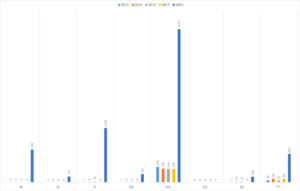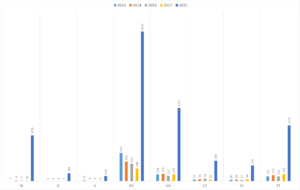- 2021/09/15
EFHR invites you to have a look at the statistical information for 2013-2021 concerning the cases in which the first and last name in the Population Register of the Republic of Lithuania were written using “w”, “q”, “x” and other non-Lithuanian characters

The European Foundation of Human Rights (EFHR) has been taking action for the right to the original spelling of names and surnames for 11 years. EFHR has long emphasised that the right to have one’s name recorded in its original form is one of the fundamental human rights, arising from the right to respect for private and family life. Each individual has the right to have his or her name recorded in its original form and to have it officially recognised as part of their identity. The record of first and last name in their original form should be recognised by the Lithuanian institutions as an integral part of fundamental human rights, which protects individuals from unlawful interference in their private life. We rejoice in the fact that EFHR has already won over 120 cases in this area.
Below we present to you the official statistics from the Population Register of the Republic of Lithuania for the period 2013-2021, which show that several thousand people have valid documents (passport, identity card or residence permit) with a forename or surname in which there are “rz”, “cz”, “sz”, “nn” and other combinations of letters as well as that their number has been gradually increasing over the years. Thanks to the enormous dedication and commitment of the EFHR to carry out various social information campaigns for the original spelling of names and surnames, the public awareness has increased, and thus their demand for entries in which their names are written in the original version. EFHR continues to present new initiatives on this very issue and is glad that these actions have contributed to such a dynamic increase in the number of first and last name entries in their original form.
Chart number 1 shows the number of forename entries with letters “w”, “q”, “x”, “rz”, “nn” “cz”, “sz” and “tt”
Chart number 2 shows the number of surname entries containing “w”, “q”, “x”, “rz”, “nn” “cz”, “sz” and “tt”
Let us first look at forenames containing double n – “nn”, such as JOANNA or ANNA. In 2013, 359 of them were registered, and in 2021 there are already 3574. This represents a nearly 10-fold increase in eight years. Another monumental 27-fold increase can be noticed in the names with the digraph “rz”, among others ANDRZEJ, MALGORZATA and KATARZYNA. In 2013 there were merely 7 such names, this number increased to 8 in 2015 until it reached 191 in 2021.
In the years 2013-2021, the number of given names containing the double consonant “tt”, such as VIOLETTA, increased fourteenfold. In 2021, there are 660 citizens whose forename contains “tt”, in 2017 there were 83, and in 2013 only 46. It is also worth noting that in 2021 it was possible to register 7 names containing the diphthong “cz” (e.g. CZESLAW) for the first time. The number of forenames with the digraph “sz” (e.g. TOMASZ) has also increased significantly, from just one in 2013 to 129 in 2021.
Statistics also show an increase in the number of surnames with “sz”, “tt”, “rz”, “cz” and other combinations of letters.
Over the last eight years (2013-2021) the number of names containing “sz” (370) and “tt” (1315) has increased more than tenfold. In 2021, as many as 3527 people have a surname that contains the digraph “rz” (e.g. RZEPECKI). Compared to 2017, this is almost twelve times as much since back then there were only 298 of them. Likewise with surnames containing the letter “w”, such as WIEK, of which 1073 arrived in eight years. We can also notice an increase in surnames with the diphthong “cz”, for example CZECH and BOCZEK. In 2021 there are 483 of them, which is 8 times more than 6 years earlier (58 in 2015).
We would like to express our delight at the fact that the Ministry of Justice of the Republic of Lithuania has recognised the problems faced by persons who are refused registration of their original surnames containing non-Lithuanian letters by the Registry Office. On the 8th of September 2021 The Ministry of Justice has issued recommendations to the Registry Offices that a child’s name be entered using non-Lithuanian letters of the Latin alphabet in case where a court has already allowed one member of the same family, a citizen of the Republic of Lithuania, to enter their surname with the letters Q, W, X. It is envisaged that in cases where the issue of spelling the family name using non-Lithuanian letters has already been resolved through judicial proceedings and where the civil status act of one of the parents has been amended based on a valid court decision, the parents’ application to enter the surname of the child in the birth certificate of said child or to change the surname of the child in relation to the already entered one should be accepted by the Registry Office. These recommendations will avoid unnecessary legal processes for giving another member of the same family the same surname because such cases will be able to be resolved by the Registry Offices and not by courts.
More information on the spelling of forenames and surnames can be found on the EFHR’s website: https://en.efhr.eu/spelling-of-names-and-surnames/.





